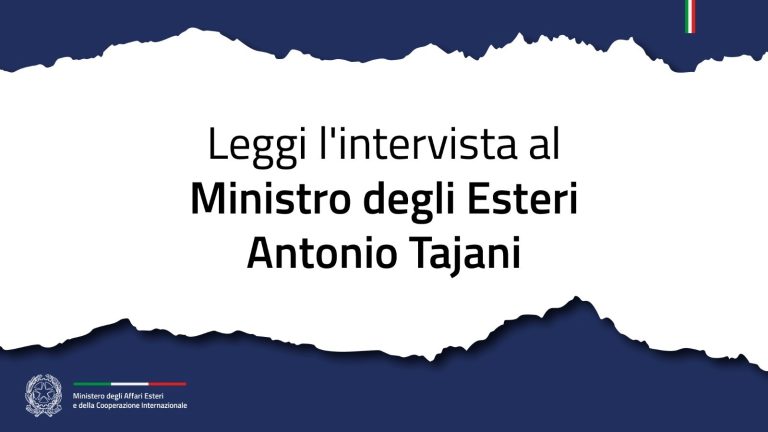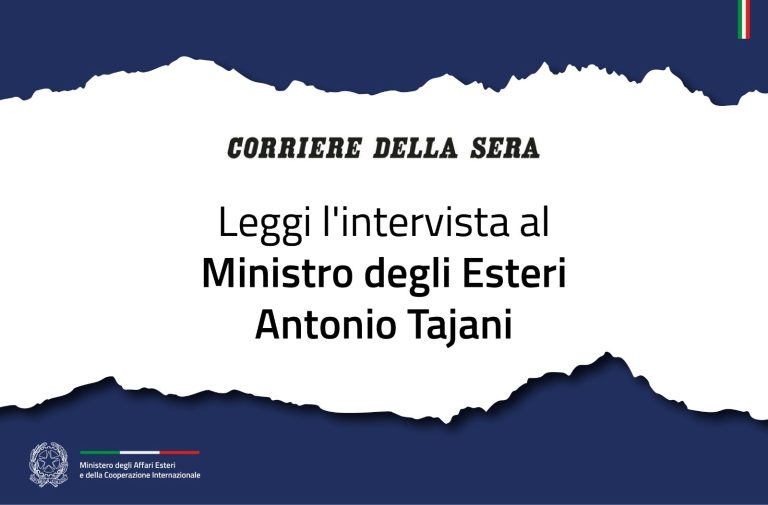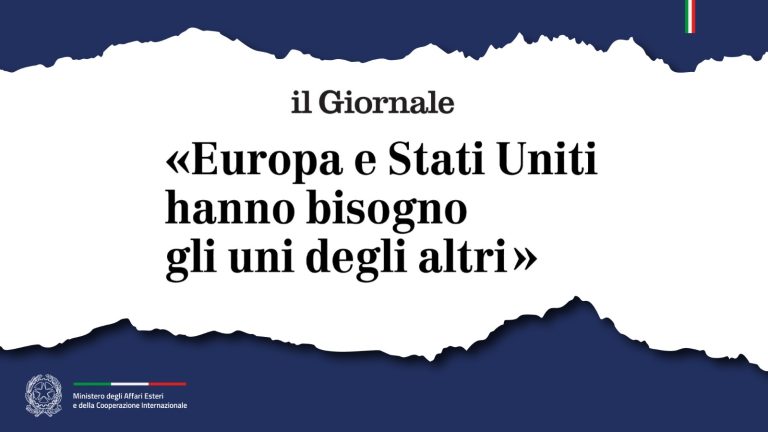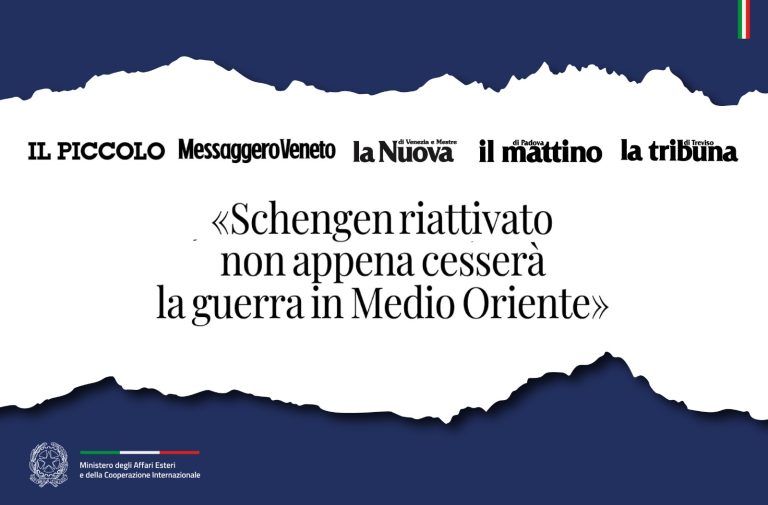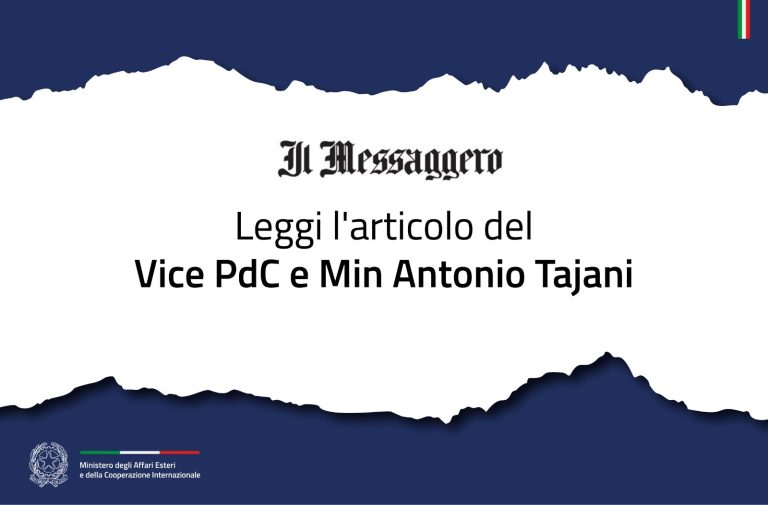What can we hope for, what can we expect from the Anchorage summit in Alaska?
“We can hope that it marks a turning point, and that following this meeting, a genuine negotiation between Russia and Ukraine — between Putin and Zelensky — can begin. That is what we must hope for. We’ll need to see whether such a result could actually stem from this first encounter — which is something else entirely.” Italy’s Deputy Prime Minister and Minister of Foreign Affairs Antonio Tajani is direct and to the point on the eve of the mid-August summit.
What does the outcome depend on?
“On Putin. I don’t know how willing he’ll be to listen to Trump’s requests or how interested he is in reaching a ceasefire to end the war quickly. The key issue, therefore, isn’t so much what Trump asks, but what Putin is prepared to accept. The ball’s in his court. It’s up to him to say whether he wants dialogue, whether he’s open to a meeting with Zelensky or not. That’s the crux of the matter — and we’ll understand Putin’s real intentions about ending the war from how he responds to Trump. It seems to me, though, that right now Russia is trying to grab as much territory as it can.”
Do you think Putin might refuse?
“It’s not an easy situation for him. He’s got an army of one and a half million people who earn three times more than an average Russian worker. The entire Russian economy has essentially been converted to defence — which means it’ll be very hard to return to a peacetime economy. Putin also faces serious domestic issues — including the need to show strength. It won’t be easy, but ideally this summit would lead to the scheduling of a future three-way meeting.”
At present, Europe and Zelensky seem to be watching from the sidelines, but at least the Euro-Atlantic summit saw Trump willing not to go it alone.
“I have to say that even back in the winter, at the Munich Security Conference, Secretary of State Marco Rubio said that Europe needed to be involved. It seems everyone came away from the recent meeting satisfied — it showed the West was united. Trump’s words, in this context, definitely sent a positive signal to both Europe and Zelensky. It certainly strengthens Ukraine’s position, gives it more backing.”
What role should Ukraine play in the negotiations?
“Every single decision concerning Ukraine must be made with Ukraine and the other parties involved. No one else can decide this country’s fate. A peace agreement cannot be imposed on Ukraine — let’s not forget that Ukraine is the victim of an act of aggression.”
There’s been widespread discussion of territorial concessions — a hugely complex issue.
“Once there’s a ceasefire, direct negotiations should begin — as I mentioned — between Zelensky and Putin. At that stage, it will be up to Ukraine to decide the fate of its territories: no one else has the right to decide on any part of Ukraine’s land.”
What kind of guarantees should Kyiv receive regarding its security?
“There must be guarantees for its independence and its security. We’ll see who provides those guarantees and how — whether it’s the United States or others. One thing is certain: Ukraine’s security is also Europe’s security, especially now that Ukraine is a candidate for EU membership.”
Who should ensure compliance with the ceasefire, if one is reached?
“Right from the start, we’ve put forward a very clear proposal: there should be a presence authorised by the UN Security Council, ideally with agreement from both Russia and China. Without the Russians’ consent, such a mission would be ineffective.”
Let’s turn to the other major war front: the Middle East. The other night you welcomed children arriving in Italy as part of a new humanitarian mission.
“Yes, it was the largest operation of its kind to date — three military aircraft evacuated many children from Gaza. We are, along with Egypt, Türkiye, Qatar and the Emirates, one of the countries that has taken in the highest number of refugees from Gaza. I’d like to add something: I’ve seen numerous calls for journalists to be allowed into Gaza — and I believe the time has come. Journalists must be allowed in to report independently on the dire situation in the Strip. That’s not something Israel can simply ignore.”
From a political-diplomatic perspective, has Italy’s stance on Netanyahu’s plan to occupy Gaza now been fully defined?
“We’re absolutely against it. We’ve said so clearly and signed a document with several other countries to that effect. We also oppose any new acts of aggression or annexation by Israel in the West Bank. All of this undermines the two-state solution — which, for us, remains the only viable path to peace.”
At the same time, Italy has condemned Netanyahu’s massacres in Gaza.
“We’ve made it clear that the line of proportional response to the 7 October 2023 attack was crossed a long time ago. What we’re witnessing now is a bloodbath — the signs are unmistakable. And because we are friends of Israel, we are saying that what they’re doing is extremely serious — including the attacks on Christians, which only serve to benefit Hamas.”
Yet the opposition continues to accuse your government of failing to recognise the Palestinian State.
“We’re in favour of recognising Palestine, but first the Palestinian State has to be built — and right now, it doesn’t exist. That’s why we’re working to help establish it. This is also why we support a UN-led mission, under Arab leadership, to reunify Palestine. In that context, we would even be ready to send Italian troops. On the 1st of September, in fact, the Palestinian Minister of Foreign Affairs will visit Rome. I’ll also add that Tony Blinken, Biden’s Democratic Secretary of State, said just three days ago that recognising Palestine as things stand now would have no practical effect — because Israel would carry on regardless.”
One final point: with Salvini on one side and Crosetto on the other, it seems like quite a few people in government want to be involved in foreign policy.
“It’s perfectly legitimate for them to want to express views on foreign affairs. But foreign policy is the responsibility of the Prime Minister and the Minister of Foreign Affairs. That’s the official line — and I don’t believe there’s ever been a deviation from it. Public statements are another matter entirely.”

